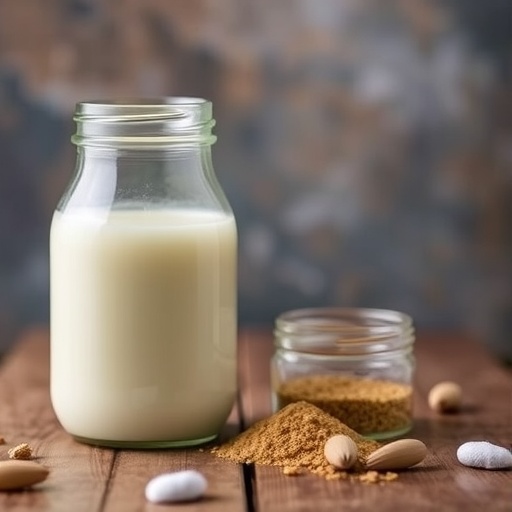The innovative technique developed in this study employs alginate, a biodegradable polymer derived from brown seaweed, known for its gel-forming capabilities. The researchers have combined this polymer with the protective qualities of fruit juice to create microencapsulated beads that safeguard the probiotic bacteria from harsh storage conditions. This dual approach not only protects the cells but also opens avenues for flavor diversification and nutritional enhancement in the final fermented product.
.adsslot_MpwRyfAKcx{ width:728px !important; height:90px !important; }
@media (max-width:1199px) { .adsslot_MpwRyfAKcx{ width:468px !important; height:60px !important; } }
@media (max-width:767px) { .adsslot_MpwRyfAKcx{ width:320px !important; height:50px !important; } }
ADVERTISEMENT
GABA is a naturally occurring neurotransmitter that plays a crucial role in regulating brain activity. Elevated levels of GABA are associated with various health benefits, including reduced anxiety, improved sleep, and increased mood stability. This research highlights the potential for enhancing the nutritional profile of fermented dairy products through the strategic cultivation of well-studied probiotic strains capable of producing significant amounts of GABA.
The results of this study have far-reaching implications for both the dairy industry and consumers. For manufacturers, the ability to produce stable, probiotic-rich products with enhanced health benefits opens new markets and consumer bases. For consumers, availing of fermented milk products fortified with both beneficial bacteria and a natural, functional compound like GABA presents a compelling health choice.
Moreover, this research aligns with a growing trend towards functional foods—products that provide health benefits beyond basic nutrition. As consumers become increasingly aware of the importance of gut health and overall well-being, the incorporation of multi-functional probiotics such as Lactiplantibacillus plantarum B7 into popular food items could satisfy demand while improving public health outcomes.
The study’s findings could lead to broader applications in the food industry, beyond mere fermented milk. Enriching a variety of dairy and non-dairy products with encapsulated probiotics could create new possibilities for healthy snacks, beverages, and even supplements. This would not only improve product efficacy but also cater to a range of dietary preferences and restrictions, including vegan-friendly options with plant-based alginate.
This research paves the way for future innovations in food preservation and nutritional enhancement, encouraging further exploration of natural encapsulation methods. By leveraging the properties of fruits and other plant materials, food scientists may discover novel ways to improve health benefits while respecting consumer demand for natural ingredients.
Subject of Research: Enhancing cell viability and GABA production in fermented milk using fruit juice-coated alginate microencapsulated Lactiplantibacillus plantarum B7 during storage.
Article Title: Enhancing cell viability and GABA production in fermented milk using fruit juice-coated alginate microencapsulated Lactiplantibacillus plantarum B7 during storage.
Article References: Pannerchelvan, S., Jawlan, L.L.L., Wasoh, H. et al. Enhancing cell viability and GABA production in fermented milk using fruit juice-coated alginate microencapsulated Lactiplantibacillus plantarum B7 during storage. Int Microbiol (2025). https://doi.org/10.1007/s10123-025-00662-7
Image Credits: AI Generated
DOI: https://doi.org/10.1007/s10123-025-00662-7
Keywords: Lactiplantibacillus plantarum, GABA, probiotics, fermented milk, alginate microencapsulation, fruit juice, gut health, functional foods.
Tags: alginate use in food technologyfermented milk production techniquesfruit juice as a probiotic protective layerGABA production in dairygut health and probiotic viabilityhealth benefits of fermented milkinnovative dairy product developmentLactiplantibacillus plantarum B7 benefitsmicroencapsulation methods for probioticsnatural food preservation methodsprobiotic strain enhancementprobiotic strain survival during storage





